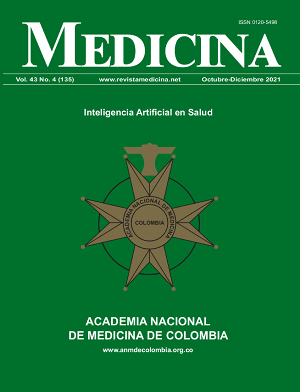Herramientas de soporte para el razonamiento clínico en medicina interna basadas en inteligencia artificial
DOI:
https://doi.org/10.56050/01205498.1645Palabras clave:
Inteligencia artificial, servicios médicos, herramientas, ética, registros clínicos electrónicosResumen
La inteligencia artificial (IA) es un conjunto de herramientas que simulan los procesos cognoscitivos de los humanos y con base en el análisis de un gran volumen de datos tiene la capacidad de recopilar y organizar la información, permitiendo procesos de toma de decisiones, razonamiento, reconocimiento de voz, percepción de imágenes e interpretación visual. En medicina, se abre paso como una estrategia para el mejoramiento en la prestación de servicios en las diferentes especialidades. A través de un caso clínico se mostrará la aplicabilidad de la inteligencia artificial en la cotidianidad del ámbito ambulatorio de la medicina interna, que se resalta la relevancia de la frase del Dr. Maskó: “Los médicos no serán reemplazados por la inteligencia artificial, pero aquellos que no la usen probablemente, serán reemplazados por aquellos médicos que si la usen”.
Biografía del autor/a
Andrés Eduardo Rico-Carrillo, JaveSalud IPS
MD. Miembro Fundador de AIpocrates.
Departamento de Medicina Interna, Fundación Javeriana de Servicios Médicos y Odontológicos Interuniversitarios “Carlos Márquez Villegas” JaveSalud IPS, Bogotá.
Referencias bibliográficas
https://www.rcgp.org.uk/-/media/Files/CIRC/artificial-intelligence-and-primary-care-jan-2019.ashx?la=en
2. Augmented intelligence in health care [Internet]. American Medical Association; 2021 [consultado 20 septiembre 2021]. Disponible en:
https://www.ama-assn.org/system/files/2019-08/ai-2018-board-policy-summary.pdf
3. Augmented intelligence in health care [Internet]. American Medical Association; 2021 [consultado 20 septiembre 2021]. Disponible en:
https://www.fsmb.org/siteassets/artificial-intelligence/pdfs/ama-ai-advocacy.pdf
4. Miller D., Brown E. Artificial Intelligence in Medical Practice: The Question to Answer? Am J Med 2018;131(2):129-133.
5. Meskó B, Hetényi G., Gyorffy Z., Will artificial intelligence solve the human resource crisis in healthcare? BMC Health Serv Res. 2018;18(1):545
6. Yu H., Beam A., Kohane I. Artificial intelligence in healthcare. Nat Biomed Eng. 2018;2(2):719–731.
7. Briganti G., Le Moine O., Artificial Intelligence in Medicine: Today and Tomorrow. Front Med (Lausanne). 2020;7:27.
8. Jiang F., Jiang Y., Zhi H., Dong Y., Li H., Ma S, et al. Artificial intelligence in healthcare: past, present and future. Stroke Vasc Neurol. 2017;2(4):230-243.
9. Krittanawong C., Johnson K., Rosenson R., Wang Z., Aydar M., Baber U, et al. Deep learning for cardiovascular medicine: a practical primer. Eur Heart J. 2019;40(25):2058–2073.
10. Choi E, Schuetz A, Stewart WF, Sun J. Using recurrent neural network models for early detection of heart failure onset. J Am Med Inform Assoc 2017;24(2):361–370.
11. Tison GH, Sanchez JM, Ballinger B, Singh A, Olgin JE, Pletcher MJ, Vittinghoff E, et al. Passive detection of atrial fibrillation using a commercially available smartwatch. JAMA Cardiol. 2018;3(5):409–416.
12. Nagaran V., Lee SL., Robertus JL., Nienaber CA., Trayanova NA., Ernst S,. Artificial Intelligence in the Diagnosis an Management and Arrythmias, Eur Heart J. 2021;42(38):3904-3916.
13. Hindricks G., Potpara T., Dagres N., Arbelo E., Bax J., Blomström-Lundqvist C, et al. 2020 ESC Guidelines for the Diagnosis and Mangement of Atrial Fibrillation Developed in Collaboration with The European Association for Cardio-Thoracic Surgery (EACTS): The Task Force for The Diagnosis and Management of Atrial Fibrillation of the European Society of Cardiology (ESC) Developed with the Special Contribution of The European Heart Rhythm Association (EHRA) of the ESC.- Eur Heart J. 2021;42(5):373-498.
14. Jauhar S., The Demise of the Physical Exam. N Engl J Med. 2006;354(6):548-551.
15. Mistry P., Artificial intelligence in primary care. Br J Gen Pract. 2019;69(686):422-423.
16. Beam A., Kohan I. Translating Artificial Intelligence Into Clinical Care. JAMA. 2016;316(22):2368-9.
17. Dwivedi A.,Deivedi SS., Tariq MR., Qiu X., Hong S., Xin Y. Scope of Artificial Intelligence in Medicine. J Res Med Dent Sc. 2020;8(3):137-140.
18. Murdoch T., Detsky A. The Inevitable Application of Big Data to Health Care. JAMA. 2013;309(13):1351-2.
19. Obermeyer Z., Emanuel E. Predicting the Future — Big Data, Machine Learning and Clinical Medicine. N Engl J Med. 2016;375(13):1216-9.
20. Ricco J., Guetarni F., Holh P. Learning from Artificial Intelligence and Big Data in Health Care. Eur J Vasc Endovasc Surg. 2020;59(6):868-869.
21. Ross EG, Shah NH, Dalman RL, Nead KT, Cooke JP, Leeper NJ. The use of machine learning for the identification of peripheral artery disease and future mortality risk. J Vasc Surg. 2016;64(5):1515-22.
22. Yin J., Ngiam K., Teo H. Role of Artificial Intelligence Applications in Real-Life Clinical Practice: Systematic Review. J Med Internet Res. 2021;23(4):e25759).
23. Meskó B., Drobni Z., Bényei É., Gergely B., Györffy Z. Digital health is a cultural transformation of traditional healthcare. MHealth. 2017;3:38.
24. Ferguson T. (doctom.com) [Internet]. Doctom.com. 2021. [consultado 20 septiembre de 2021]. Disponible en: http://www.doctom.com/
25. Eysenbach G. What is e-health? J Med Internet Res. 2001;3(2):E20.
26. Dignum V. Ethics in artificial intelligence: introduction to the special issue. Ethics and Information Technology.2018;20(1):1–3.
27. Read the Belmont Report. [Internet]. HHS.gov. 2021 [consultado 20 septiembre de 2021]. Disponible en:
https://www.hhs.gov/ohrp/regulations-and-policy/belmont-report/read-the-belmont-report/index.html
28. The Good Clinical Practice [Internet]Gco.nidatraining.org. 2021 [consultado 14 octubre de 2021] . Disponible en: https://gcp.nidatraining.org
29. Protecting Human Research Participants | PHRP Training [Internet]. Phrptraining.com 2021 [consultado 20 septiembre de 2021]. Disponible en: https://phrptraining.com
30. Topol E., High-performance medicine: the convergence of human and artificial intelligence. Nat Med. 2019;25(1):44–56
31. Garcia-Vidal C., Sanjuan G., Puerta-Alcalde P., Moreno-García E., Soriano A. Artificial intelligence to support clinical decision-making processes. EBioMedicine. 2019;46:27–29.
32. Noorbakhsh-Sabet N., Zand R., Zhang Y., Abedi V. Artificial Intelligence Transforms the Future Artificial Intelligence Transforms the Future of Health Care. Am J Med. 2019;132(7):795−801.
33. Dzobo k., Adotey S., Thomford N., Dzobo W. Integrating Artificial and Human Intelligence: A Partnership for Responsible Innovation in Biomedical Engineering and Medicine. OMICS.2020;24(5):247-263.
34. Yoav M.,Ronit B. Introduction to artificial intelligence in medicine. Minim Invasive Ther Allied Technol. 28:(2):73-81.
35. Chen, M., Decary M.,Artificial intelligence in healthcare: An essential guide for health leaders. Healthc Manage Forum. 2020;33(1):10-18.
36. Mehta N., Devarakonda M. Machine learning, natural language programming, and electronic health records: The next step in the artificial intelligence journey? J Allergy Clin Immunol. 2018;141(6):2019-21.
37. Seyhan A., Carini C. Are innovation and new technologies in precision medicine paving a new era in patients centric care? J Transl Med. 2019;17(1):114.
38. Chi E.,Chi G., Tsui C., Jiang., Jarr K., Kulkarni C, et al. Development and Validation of an Artificial Intelligence System to Optimize Clinical Review of Patient Records. JAMA Netw Open. 2021;4(7):e2117391.
39. Beveridge M., Fox J., Automatic generation of spoken dialogue from medical plans and ontologies. J Biomed Inform.2006 39(5):482-499.
40. Migneault J., Farzanfar R., Wright JA., Friedman R. How to write health dialog for a talking computer. J Biomed Inform. 2006;39(5):468–481.
41. Fox J., Cognitive systems at the point of care: The CREDO program. J Biomed Inform. 2017;68:83–95.
42. Smith T. 10 Ways Health Care Could Transform Primary Care. [Internet]. American Medical Association. 2021. [consultado 14 octubre de 2021]. Disponible en:
https://www.ama-assn.org/practice-management/digital/10-ways-health-care-ai-could-transform-primary-care
43. Lin S., Mahoney M., Sinsky C., Ten Ways Artificial Intelligence Will Transform Primary Care. J Gen Intern Med. 2019;34(8):1626–30.
44. Lin S., Shanfelt T., Asch S. Reimagining Clinical Documentation With Artificial Intelligence. Mayo Clin Proc. 2018;93(5):563-565.
45. Young R.,Burge S., Kumar K., Wilson J., Ortiz D. A TimeMotion Study of Primary Care Physicians’ Work in the Electronic Health Record Era. Fam Med. 2018;50(2):91-9.
46. Wong J., Murray M., Zhou L., ToH, Using machine learning to identify health outcomes from electronic health record data. Curr Epidemiol Rep. 2018;5(4):331–342.
47. Xiao C., Choi E., Sun J., Opportunities and challenges in developing deep learning models using electronic health records data: a systematic review. J Am Med Inform Assoc. 2018;25(10):1419–1428.
48. Fogel A., Kvedar J. Artificial intelligence powers digital medicine. NPJ Digital Med. 20181:5.
49. Garg S., Williams N., Ip A., Dicker A. Clinical Integration of Digital Solutions inHealth Care: An Overview of the Current Landscape of Digital Technologies in Cancer Care. JCO Clin Cancer Inform. 2018;2:1-9.
Cómo citar
Descargas
Publicado
Número
Sección
Licencia
Derechos de autor 2022 Medicina

Esta obra está bajo una licencia internacional Creative Commons Atribución-NoComercial-SinDerivadas 4.0.
Copyright
ANM de Colombia
Los autores deben declarar revisión, validación y aprobación para publicación del manuscrito, además de la cesión de los derechos patrimoniales de publicación, mediante un documento que debe ser enviado antes de la aparición del escrito. Puede solicitar el formato a través del correo revistamedicina@anmdecolombia.org.co o descargarlo directamente Documento Garantías y cesión de derechos.docx
Copyright
ANM de Colombia
Authors must state that they reviewed, validated and approved the manuscript's publication. Moreover, they must sign a model release that should be sent.





